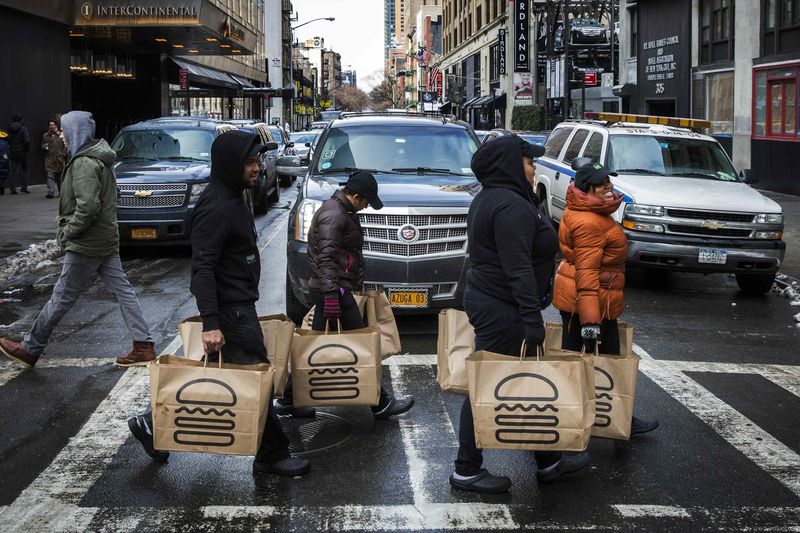By Amrutha Gayathri and Lisa Baertlein
(Reuters) - Shares of Shake Shack Inc
Shake Shack's debut is the latest in a string of blockbuster IPOs from trendy restaurant chains that cater to younger and more affluent diners willing to pay a bit more for fresher and higher quality food. Growth-hungry investors are hoping to replicate the red-hot run of industry darling Chipotle Mexican Grill (N:CMG).
But Shake Shack's own CEO Randy Garutti cast doubt on whether it will do so, calling the chain known for decadent milkshakes and hormone- and antibiotic-free burgers a "very measured growth company."
Its IPO followed the successful listing two months ago of fellow premium burger seller Habit Restaurants (O:HABT). Other hot restaurant debuts have been followed by stock swoons, including Noodles & Co (O:NDLS) and sandwich maker Potbelly Corp (O:PBPB).
Based on 2013 earnings, the company that grew out of a hotdog cart in New York's Madison Square Park is trading at an eye-popping price-to-earnings ratio of about 325, with each restaurant valued at about $27 million.
"Seems like a nosebleed valuation," said Bob Goldin, an executive vice president at foodservice consultancy Technomic. Shake Shack would need "explosive growth for years and years" to justify its stock price, he said.
Its shares hit a session high of $52.50, a gain of 150 percent from its IPO price of $21, raising questions about whether the stock was overvalued. The stock trimmed gains slightly to close at $45.90.
"This is a valuation hurdle that is well ... shaky," said Douglas Kass, president of hedge fund Seabreeze Partners Management Inc, describing the rally as indicative of "silly season."
While the 63-unit chain boasts some of the industry's highest average annual restaurant sales, it only plans to add 10 domestic restaurants per year. Many of those new restaurants will be in lower-profit-margin markets outside New York City.
The company, which had revenue of $83.8 million in the 39 weeks to Sept. 24, eventually plans to have 450 U.S. locations. Shake Shack will also slowly expand overseas, with a store set to open in London later this year and others likely to follow, Garutti said, without providing a specific forecast.
When Chipotle went public in 2006, it had almost 500 U.S. restaurants. Shares in the chain, which now has roughly 1,700 U.S. restaurants and is known for its uncanny ability to profitably increase sales, debuted at $22 and trade at more than $710.
"We're at a point where investors are willing to give 'story' stocks the benefit of a doubt," said James Angel, associate professor of finance at Georgetown University's McDonough School of Business.
Repeating Chipotle's success has proven elusive for most restaurant operators, and it could be even harder to do in the crowded and competitive high-quality burger segment.
"If it were easy to replicate, plenty of other people would have already done it," said Angel.
Shake Shack raised $105 million from its initial public offering.
Its IPO has been bonanza for founder Daniel Meyer, whose 21 percent stake was worth about $390 million based on the stock's intraday high.
Meyer, the chef-owner of popular New York restaurants Blue Smoke, Gramercy Tavern and Union Square Cafe, opened the first Shake Shack in 2004.
J.P. Morgan and Morgan Stanley were lead underwriters for the IPO.
Shake Shack's customers spend roughly $30 for a meal for two, considerably more than diners spend at struggling fast-food giant McDonald's Inc (N:MCD), which this week replaced its CEO after a dismal 2014.
Sales at premium burger chains, which also include Five Guys Burgers and Fries, the Counter and Smashburger, rose 9 percent in 2013, according to Technomic, while overall sales at all burger chains including McDonald's fell 1 percent.

Some old-school operators are also riding the wave. Shares in mall-based chain Red Robin Gourmet Burgers, which went public over a decade ago, have more than doubled in the last two years.